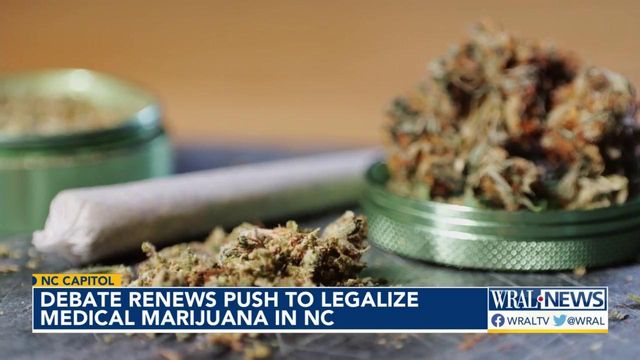Medical marijuana has a new spark of life in NC legislature
Republican state Sen. Bill Rabon says pot saved his life by giving him the strength to endure a particularly intense chemotherapy treatment for stage 3 colon cancer.
"I'd light up a joint or whatever you want to call it — I'd never smoked in my life so I wasn't very good at it — and I'd take about three puffs of marijuana, and my symptoms would go away before you could bat your eye," Rabon, R-Brunswick, said Tuesday during a House Health Committee meeting, where his bill to legalize medical marijuana was being debated.
It was the first time he has publicly told his story — a rare instance of a top-ranking Republican official talking openly, and positively, about drug use. And it’s the kind of relief he hopes others can find if Senate Bill 3 succeeds. If it passes, North Carolina would become the 39th state in the country to let people use pot with a doctor’s prescription.
The fact that the bill even got a hearing in the House is an important sign of life for the bill after being ignored by the chamber last year, despite its broad bipartisan support in the Senate. The bill passed the Senate again this year in March, 36-10. The House committee didn’t take a vote Tuesday, so members could ask questions without having to immediately decide which side to take.
Rabon said his oncologist told him to start smoking marijuana because no prescription antinausea medicine would work, with as much chemo as he was going to need.
Rabon, who was 48 at the time of his diagnosis, said that soon after that he met with his local sheriff and police chief, venting his frustration at having to take illegal drugs to save his life — and his fear that being caught buying pot could endanger his veterinary license. Shortly after that meeting, he said, marijuana began mysteriously appearing in his mailbox.
Whoever decided to slip it to him, he's glad they did.
"It's the only reason I'm alive today," said Rabon, who is now 71. "No science behind it. But I can tell you, I know. I know there are tens of thousands of people in this state who can benefit from it just like I did."
Lawmakers hear pros and cons
Rabon's acknowledgment that the scientific research into medical marijuana is lacking stems from the fact that it's incredibly difficult for scientists to study. Even though most states allow medical marijuana, it remains illegal federally, which means the federal government can't study it — nor can most universities, which are reliant on federal grant funding.
Critics of the proposal say lawmakers should be more concerned by that.
"We do not decide medicine in the United States by anecdote or by stories," David Evans, with the group North Carolinians Against Legalizing Marijuana, told lawmakers Tuesday. "We decide it based on science. I am going to ask you to exercise some humility. You are not the FDA. You are not qualified to be making this decision."
Advocates typically don’t claim marijuana can cure diseases, but they do say it can help treat pain, nausea and anxiety.
If this bill becomes law, doctors could prescribe marijuana for patients with cancer, post-traumatic stress disorder, Parkinson’s disease and sickle cell anemia, among other ailments.
Rabon has consistently sought to shoot down proposals from Democratic lawmakers who want to expand the list of approved medical ailments, to include conditions like chronic pain or glaucoma. The bill’s sponsors have said those are too vague and have been used as a loophole in other states to open up the legal use of medical marijuana to too many people.
He has said that if North Carolina does legalize marijuana using his plan, the rules here would be the strictest of any of the 39 states that have legalized medical marijuana — a nod to those who worry it would be just the first step toward legalizing marijuana for anyone. Rabon noted Tuesday that multiple states have legalized medical marijuana but not recreational marijuana.
In addition to skeptics who fear a slippery slope toward full legalization, Christian conservative groups also cite the same moral concerns to oppose medical marijuana that also see them regularly speaking at the legislature to oppose efforts to loosen the laws that regulate alcohol or gambling.
Rep. Donny Lambeth, R-Forsyth, who chairs the health committee that debated the bill Tuesday, said he was still undecided.
A recent trip to with other lawmakers to visit a medical marijuana grow site in Mississippi alleviated his concerns about security and quality control, he said. But he and many of his constituents still need guarantees, Lambeth said, that this isn’t just the first step toward fully legalizing marijuana for anyone to use.
"The biggest issue of those who are against this simply relates to the legalization of recreational marijuana," he said. "And I think we need to be able to answer that question."
Some states have legalized medical marijuana, followed by full legalization several years later. Public polling shows both ideas enjoy majority support, both nationwide and in North Carolina specifically. But Rabon pointed to a number of states that have stopped at just medical legalization — most notably Hawaii, which he said legalized medical marijuana more than 20 years ago but has still never legalized recreational use.
Growing GOP support for pot
For medical marijuana ,what was once a far-left pipe dream now has mainstream acceptance — and an influential sponsor in Rabon, who in addition to being a cancer survivor is also one of the most powerful Republican lawmakers in North Carolina.
The newfound GOP support for medical marijuana is largely because of two separate factors. One is that the issue is highly popular. Polls have regularly shown more than 75% of North Carolinians support legalizing medical marijuana. And a WRAL News poll last year found that over half of North Carolina voters would also support full, recreational legalization of marijuana.
Also, Republican lawmakers want to find new sources of revenue for the state. Taxes and fees from marijuana could bring in millions of dollars. So could a separate project GOP leaders are also pushing this year, House Bill 347, to legalize sports betting.
Both those bills were in committee Tuesday; marijuana in the House and sports betting in the Senate.
In the last legislative session, GOP leaders approved a plan to gradually lower the corporate income tax rate to 0% within the next few years. It would shrink the annual state budget by $1 billion or more. That means schools might face budget cuts since more than half of the state budget goes to public education.
To help blunt the severity of potential future budget cuts, GOP leaders have been looking for new ways the government could make money to replace corporate taxes — in addition to expanding sales taxes, which they already did years ago as part of a different income tax cut. Marijuana could be a piece of that, along with sports betting.
Additionally, WRAL News reported earlier this year, lawmakers have discussed plans to allow four new casinos to be built around the state. And a separate bill to legalize video poker machines, House Bill 512, got its first hearing last week — but still must pass a number of legislative hurdles before potentially becoming law.








